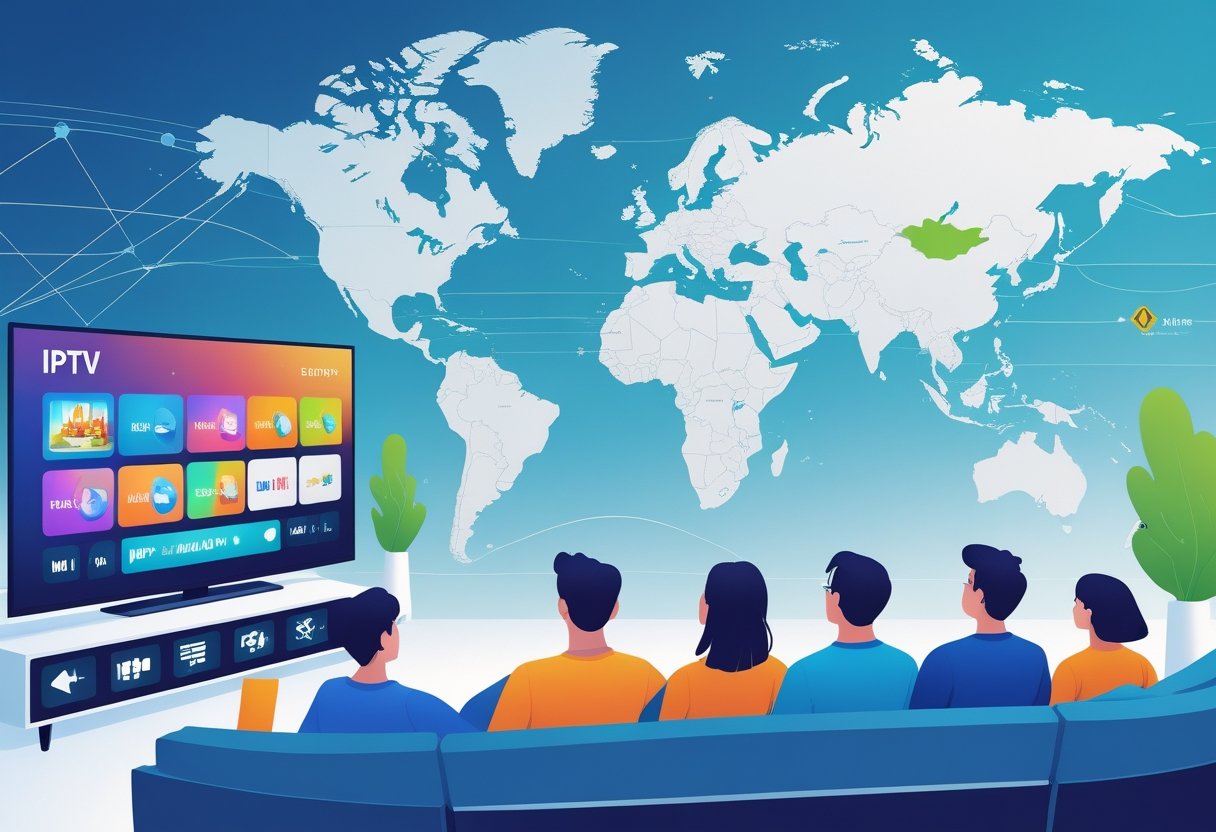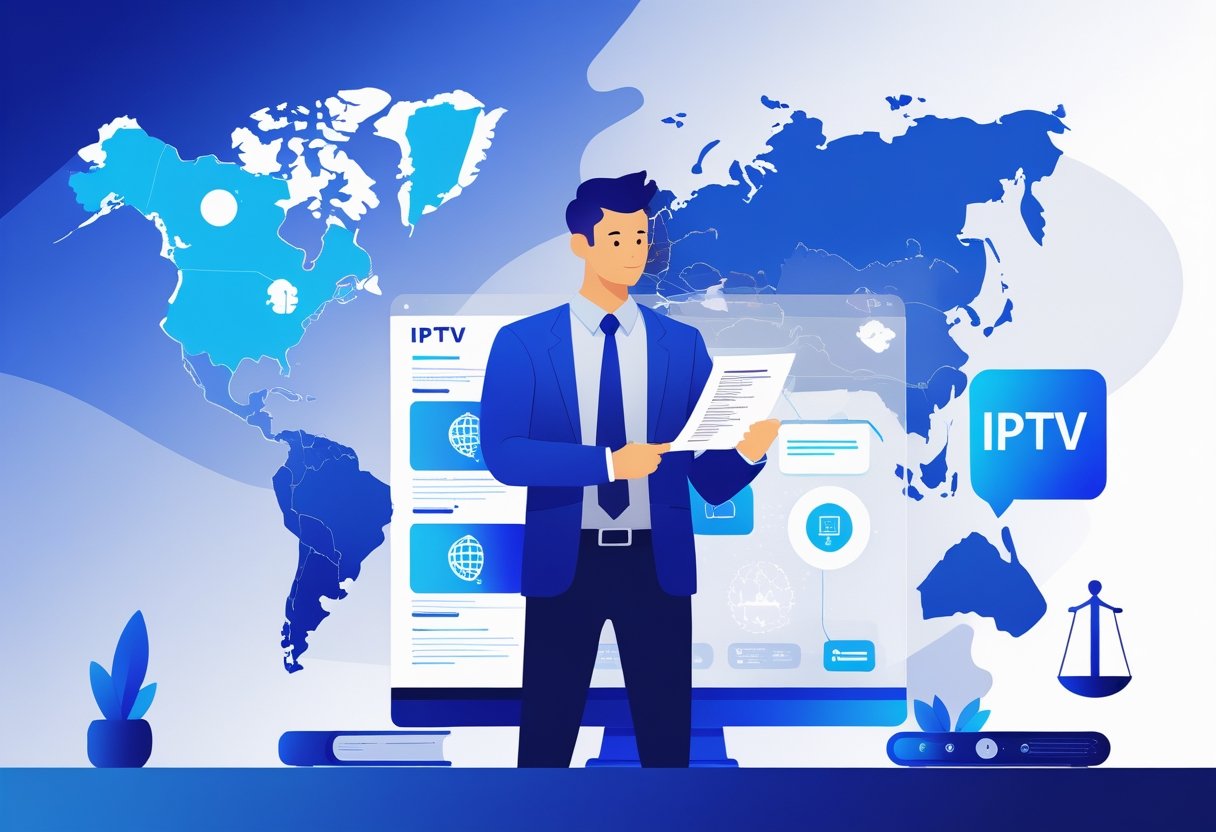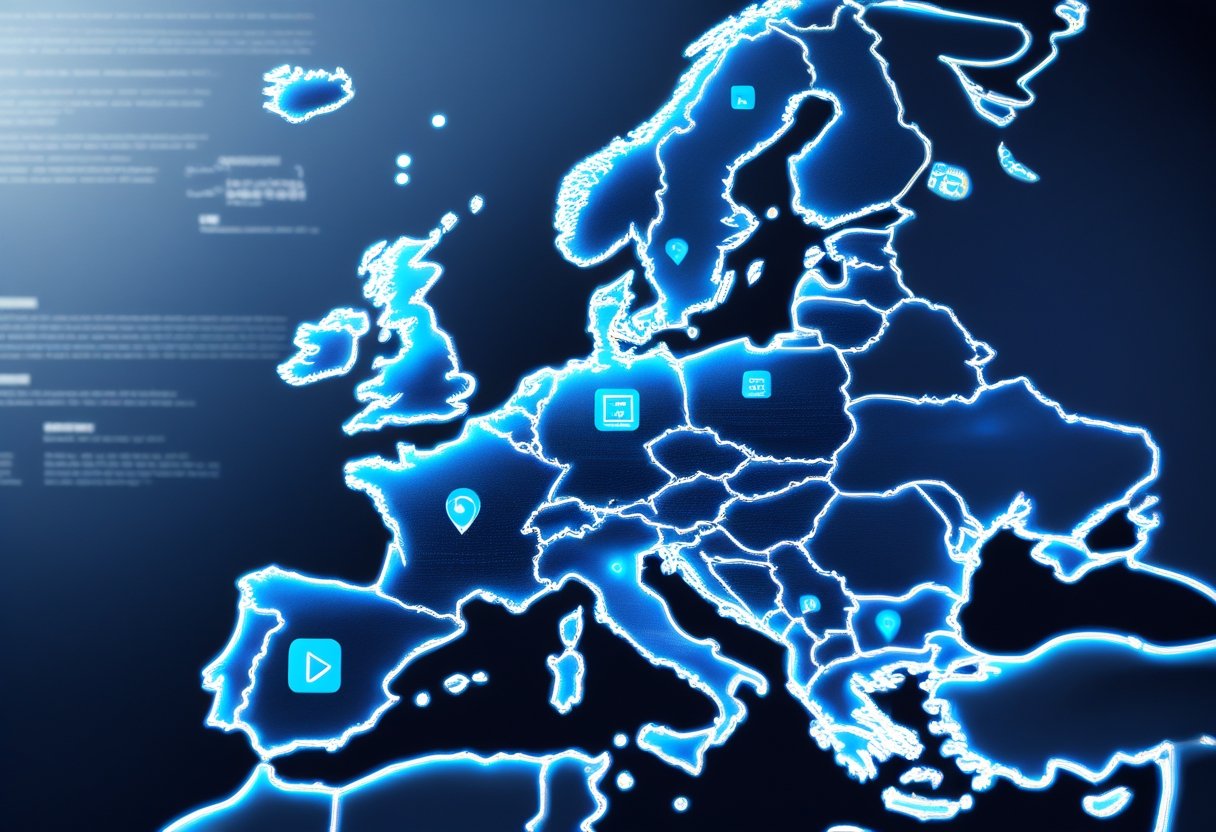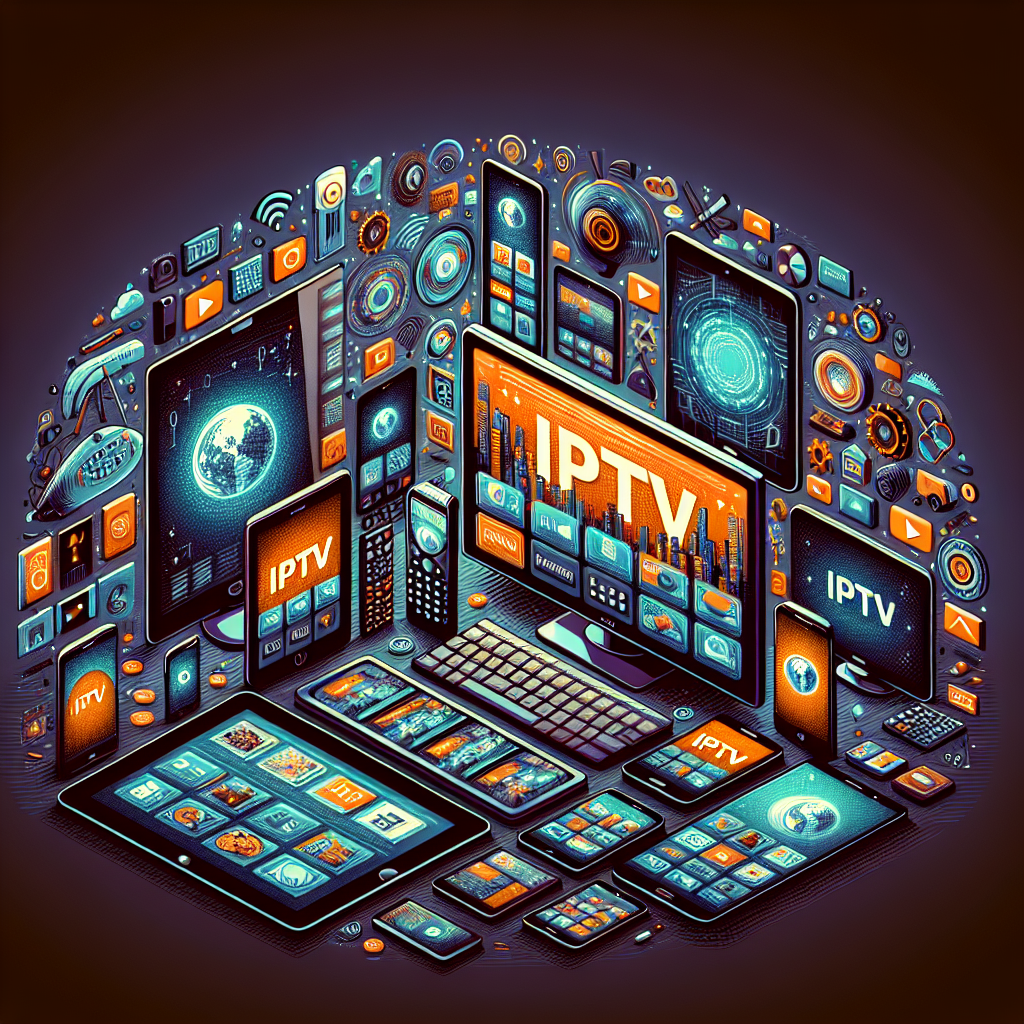IPTV services have exploded across Europe, offering viewers access to thousands of channels and on-demand content at prices that seem too good to be true. Many consumers wonder whether these streaming services operate within the law or if using them could lead to legal trouble. The legality of IPTV in Europe depends entirely on whether the service provider holds proper broadcasting licenses and complies with copyright laws.
The legal landscape of IPTV services varies significantly across European countries, creating a complex web of regulations that both providers and consumers must navigate. While legitimate IPTV services like Netflix and Amazon Prime operate legally with proper licensing agreements, unauthorized providers that stream copyrighted content without permission violate European Union copyright directives. Understanding these distinctions becomes crucial as authorities increasingly crack down on illegal operations.
This comprehensive analysis examines the regulatory frameworks governing IPTV across Europe, from licensing requirements and copyright compliance to consumer protection measures. The article explores how emerging technologies are reshaping the regulatory landscape and what consumers need to know to ensure their IPTV service operates legally while protecting their privacy and data.
Key Takeaways
- IPTV legality depends on whether providers hold proper broadcasting licenses and comply with copyright laws
- European regulations vary by country but generally prohibit unauthorized streaming of copyrighted content
- Consumers should verify their IPTV provider’s licensing status to avoid potential legal issues and protect their data
Understanding IPTV and Its Growing Popularity

Internet Protocol Television delivers content through internet connections rather than traditional broadcast methods. European viewers increasingly choose IPTV services for their flexibility and extensive content libraries.
What Is Internet Protocol Television?
IPTV uses internet protocols to deliver television content directly to devices through broadband connections. This technology streams live channels, on-demand videos, and recorded programs over IP networks.
The system works by converting traditional television signals into digital data packets. These packets travel through internet infrastructure to reach viewers’ devices.
Three main IPTV service types exist:
- Live Television – Real-time broadcasts of channels
- Video on Demand (VOD) – Pre-recorded content available anytime
- Time-shifted Media – Previously aired programs users can watch later
IPTV requires a stable internet connection and compatible device. Most services work on smart TVs, computers, tablets, and smartphones.
Unlike traditional broadcasting, IPTV allows two-way communication between providers and users. This enables interactive features like program guides and content recommendations.
Rise of IPTV Services in Europe
European IPTV adoption has grown rapidly over the past decade. Improved internet infrastructure and fiber optic networks support high-quality streaming across the continent.
Major telecommunications companies now offer IPTV packages alongside internet services. These bundled offerings attract customers seeking comprehensive digital solutions.
Key factors driving European IPTV growth:
- Faster broadband speeds reaching rural areas
- Lower costs compared to traditional cable subscriptions
- Access to international content and channels
- Flexible viewing schedules and device compatibility
Streaming services like Netflix and Amazon Prime have normalized internet-based viewing. This shift in user experience paved the way for broader IPTV acceptance.
Many European households now use legal IPTV streaming services as their primary television source. The technology appeals especially to younger demographics who prefer on-demand content.
Key Differences From Traditional TV
Traditional television relies on cable, satellite, or terrestrial broadcasting infrastructure. IPTV eliminates the need for specialized equipment like satellite dishes or cable boxes.
Broadcasting method comparison:
| Feature | Traditional TV | IPTV Services |
|---|---|---|
| Signal delivery | Cable/satellite/antenna | Internet connection |
| Content access | Scheduled programming | On-demand availability |
| Device requirements | Set-top box/cable box | Internet-connected device |
| Interactive features | Limited | Extensive options |
IPTV offers superior user experience through personalized content recommendations. Users can pause, rewind, and restart live programs without additional equipment.
Traditional TV broadcasts the same content to all viewers simultaneously. Internet Protocol Television allows individualized streams tailored to each user’s preferences.
Storage capabilities differ significantly between the two systems. IPTV services often include cloud-based recording features that traditional TV requires separate DVR equipment to match.
The channel selection process also varies considerably. IPTV users navigate through digital interfaces while traditional TV relies on channel surfing through sequential numbers.
Evaluating the Legal Status of IPTV in Europe

The legal landscape of IPTV services in Europe operates under a complex framework combining EU-wide directives with national regulations. Individual countries maintain distinct approaches to licensing requirements and enforcement practices.
Official EU Guidelines on IPTV
The European Union regulates IPTV through the Audiovisual Media Services Directive (AVMSD). This directive establishes fundamental rules for digital content distribution across member states.
The AVMSD requires IPTV providers to obtain proper broadcasting licenses. These licenses ensure compliance with copyright laws and content standards.
Key EU requirements include:
- Content provider licensing
- Age-appropriate content filtering
- Accessibility standards for disabled users
- Data protection compliance under GDPR
The directive also promotes viewer rights protection. IPTV services must maintain transparent terms of service and clear pricing structures.
European authorities work together to enforce these regulations. The European Union Intellectual Property Office coordinates anti-piracy efforts across borders.
Comparitech’s Findings on Legality
Research shows significant variations in IPTV legal enforcement across Europe. Some countries actively prosecute users while others focus only on providers.
Legal IPTV services typically display these characteristics:
- Official broadcasting partnerships
- Transparent business operations
- Customer support availability
- Regular software updates
Illegal services often exhibit warning signs. These include extremely low pricing for premium content and frequent service interruptions.
User prosecution remains relatively rare in most European countries. However, authorities increasingly target illegal IPTV providers through coordinated operations.
Internet service providers now actively block known illegal IPTV domains. This blocking occurs through court orders and regulatory compliance measures.
Role of National Laws and Variations Across Countries
Regulations differ significantly across European nations. Each country interprets EU guidelines through its own legal framework.
Germany enforces strict copyright penalties. Users caught streaming illegal content face substantial fines.
United Kingdom focuses enforcement on providers rather than consumers. However, ISPs can suspend services for repeated violations.
France operates under HADOPI anti-piracy laws. The system issues warnings before imposing penalties.
Romania maintains fewer restrictions on IPTV services. This creates a more diverse marketplace for consumers.
Southern European countries like Spain and Italy conduct regular crackdowns. These operations target both providers and user databases.
Nordic countries generally emphasize consumer education over punishment. They promote legal alternatives through public awareness campaigns.
Copyright Laws, Licensing, and IPTV Providers
IPTV providers must navigate complex copyright laws and secure proper licensing agreements to operate legally in Europe. The distinction between legitimate and unlicensed services often determines whether users face legal risks or enjoy protected streaming experiences.
Copyright Challenges Facing IPTV
European copyright laws create significant hurdles for IPTV providers seeking to offer premium content legally. Content licensing requirements demand providers negotiate with multiple rights holders before broadcasting television shows, movies, or live sports.
Key Copyright Challenges:
- Multiple licensing territories across EU countries
- High licensing costs for premium content
- Complex negotiations with broadcasters and studios
- Ongoing compliance monitoring requirements
The European Union Intellectual Property Office actively enforces these regulations. Providers who stream copyrighted material without permission face severe penalties including website seizures and criminal charges.
Many providers attempt to bypass these costs by operating without licenses. This creates a fragmented market where consumers struggle to identify legitimate services from illegal alternatives.
Legitimate vs. Unlicensed IPTV Services
Legal IPTV services obtain proper agreements with content creators and broadcasters before offering their programming to subscribers. These providers invest heavily in licensing fees to ensure compliance with European regulations.
Legitimate IPTV Characteristics:
- Valid broadcasting licenses
- Transparent business operations
- Official customer support channels
- Secure payment processing systems
Unlicensed services often promise access to premium channels at unrealistic prices. These providers typically operate from offshore locations to avoid European jurisdiction and enforcement actions.
Understanding the difference between legal and illegal services helps consumers make informed decisions. Legitimate providers display their licensing information publicly and work with established technology platforms.
Significance of Licensing Agreements
Licensing agreements form the foundation of legal IPTV operations across Europe. These contracts define how providers can distribute content and establish the financial terms for accessing copyrighted material.
Essential Licensing Elements:
- Geographic distribution rights
- Content usage duration limits
- Technical delivery specifications
- Revenue sharing arrangements
Providers must secure separate licenses for different content types. Live sports require different agreements than on-demand movies, creating complex licensing portfolios for comprehensive IPTV services.
The cost of these agreements directly impacts subscription prices. Legitimate providers pass licensing expenses to consumers, explaining why legal services often cost more than unlicensed alternatives.
Without proper licensing, providers cannot legally offer premium content to European subscribers.
Regulatory Frameworks and Compliance Requirements
IPTV providers in Europe must navigate three main regulatory areas: the Audiovisual Media Services Directive that governs content and advertising standards, GDPR requirements for user data handling, and oversight from national regulatory bodies that enforce compliance at the country level.
Influence of the Audiovisual Media Services Directive
The Audiovisual Media Services Directive (AVMSD) establishes the foundational rules for IPTV services across EU member states. This directive harmonizes regulations while allowing individual countries to implement their own specific requirements.
The AVMSD covers several critical areas that IPTV providers must address:
- Content standards and quality requirements
- Advertising restrictions and placement rules
- User protection measures for minors
- Cultural content quotas for European productions
Each member state can interpret these guidelines differently. This creates a complex regulatory landscape where providers operating across multiple countries face varying compliance requirements.
The directive also promotes local content creation. IPTV services must often dedicate specific percentages of their catalog to European-produced content.
General Data Protection Regulation (GDPR) for IPTV
GDPR creates strict data protection regulations that directly impact how IPTV providers collect and process user information. These rules apply to all companies serving European customers, regardless of where the company is based.
IPTV services must implement several key GDPR requirements:
| Requirement | Description |
|---|---|
| Consent | Clear opt-in for data collection |
| Data minimization | Collect only necessary information |
| Right to erasure | Delete data upon user request |
| Data portability | Allow users to transfer their data |
The General Data Protection Regulation requires transparent privacy policies. Users must understand what data is collected and how it is used.
Data protection violations can result in fines up to 4% of annual revenue. This makes GDPR compliance essential for IPTV providers operating in Europe.
National Regulatory Agencies and Their Role
Each European country has its own regulatory agency that enforces media and telecommunications laws. These agencies work within the EU framework but maintain authority over local compliance issues.
National agencies typically handle:
- Licensing requirements for IPTV providers
- Content monitoring and standards enforcement
- Consumer complaint resolution
- Technical standards and quality control
Countries like Germany, France, and the UK have particularly active regulatory bodies. These agencies can impose penalties, revoke licenses, or require service modifications for non-compliant providers.
The agencies also coordinate with EU-level authorities to ensure consistent enforcement. However, interpretation of rules can vary between countries, creating additional complexity for multi-national IPTV services.
Consumer Rights, User Privacy, and Data Protection
European IPTV users benefit from comprehensive legal protections under EU directives and national laws. The General Data Protection Regulation establishes strict requirements for how IPTV providers collect and process personal information.
Ensuring User Privacy in IPTV Services
IPTV providers operating in Europe must comply with strict GDPR requirements for data collection that emphasize user consent and individual rights. Users have the right to know exactly what personal data companies collect about their viewing habits.
Service providers must obtain explicit consent before gathering information. This includes viewing history, device details, and payment information. Users can request access to their stored data at any time.
Key privacy rights include:
- Right to data access and portability
- Right to correction of incorrect information
- Right to deletion of personal data
- Right to restrict data processing
IPTV companies must implement technical safeguards to protect user information. They cannot share personal data with third parties without clear user consent.
Consumer Protection Regulations in Europe
Consumer rights regarding IPTV services vary across EU member states but maintain consistent baseline protections. The Audiovisual Media Services Directive creates a framework that promotes fair access while protecting users.
French consumers benefit from particularly robust protections under national law. IPTV providers must offer clear information about their services, pricing, and terms of use.
Protected consumer rights include:
- Clear contract terms and pricing
- Right to cancel subscriptions
- Protection from misleading advertising
- Access to complaint resolution procedures
Regulatory bodies actively monitor IPTV providers to ensure compliance. Companies that violate consumer protection laws face significant penalties and potential service suspension.
Transparency in Data Handling
European data protection regulations require IPTV providers to maintain complete transparency about their data practices. Companies must publish detailed privacy policies in plain language that users can easily understand.
Providers must specify the legal basis for processing personal data. They cannot collect more information than necessary for their stated purposes.
Required transparency measures:
- Clear privacy policy statements
- Regular data protection impact assessments
- Notification of data breaches within 72 hours
- Appointment of data protection officers
Users receive notifications when companies update their data handling practices. IPTV providers must allow users to withdraw consent for data processing without penalty.
Technological Innovation and the Future of IPTV Regulation
New technologies are reshaping how European regulators monitor IPTV services and how providers deliver content to users. AI-driven compliance systems and machine learning algorithms are creating smarter enforcement tools while improving streaming quality.
Impact of Artificial Intelligence on IPTV Compliance
Artificial intelligence is transforming how European authorities track illegal IPTV operations. AI systems can now scan millions of streaming URLs in real-time to identify unauthorized content distribution.
Current AI Applications:
- Content fingerprinting technology
- Automated copyright infringement detection
- Real-time stream monitoring across multiple platforms
Regulatory bodies in Germany and France have deployed AI tools that analyze streaming patterns to spot suspicious IPTV services. These systems flag providers offering premium content at unusually low prices.
The evolving IPTV regulatory landscape in Europe shows how AI helps authorities process complaints faster. What once took weeks of manual investigation now happens in hours.
Legal IPTV providers also use AI for compliance checks. They automatically verify broadcasting licenses and ensure content geo-restrictions match licensing agreements.
The Role of Machine Learning in User Experience
Machine learning algorithms are revolutionizing how IPTV services deliver content to European viewers. These systems analyze viewing habits to optimize streaming quality and reduce buffering issues.
Key ML Applications:
| Function | Benefit |
|---|---|
| Adaptive bitrate streaming | Adjusts quality based on internet speed |
| Content recommendation | Suggests relevant shows and movies |
| Network optimization | Reduces server load during peak hours |
Licensed IPTV providers use machine learning to detect and prevent account sharing violations. The technology identifies unusual login patterns across different locations within minutes.
User experience improvements through ML include personalized channel lineups and predictive content loading. These features help legal providers compete with unauthorized services that offer similar convenience.
European data protection laws require IPTV services to implement privacy-focused ML algorithms. Providers must process user data locally and obtain explicit consent for behavioral analysis.
Predicted Trends in European IPTV Laws
European IPTV regulations will likely become more standardized across member states by 2027. Current country-by-country approaches create compliance challenges for providers operating internationally.
Expected regulatory changes include:
- Unified licensing requirements across EU nations
- Stricter penalties for unauthorized streaming
- Enhanced consumer protection measures
The expansion of 5G networks will require new regulations for mobile IPTV services. Regulatory frameworks are evolving to address faster streaming speeds and increased bandwidth capabilities.
Brexit has created separate regulatory paths for UK and EU IPTV services. British providers now follow different compliance standards than their European counterparts.
Technology companies expect regulators to introduce mandatory AI-based monitoring systems for all IPTV providers by 2026. This would automate copyright compliance and reduce manual oversight costs.
Consumer demand for cross-border streaming will push regulators toward harmonized licensing agreements. European viewers want access to content from multiple countries through single IPTV subscriptions.
Frequently Asked Questions
European IPTV laws create complex situations for users and providers. Each country maintains different rules about streaming and copyright enforcement.
What are the regulations governing IPTV usage within the European Union?
The European Union regulates IPTV through multiple legal frameworks. The Audiovisual Media Services Directive (AVMSD) establishes foundational principles for digital content distribution.
Individual EU countries enforce their own copyright laws alongside EU guidelines. Germany applies strict anti-piracy regulations with potential fines for users. France uses the HADOPI law to target unauthorized streaming.
The legal framework varies significantly across Europe due to national implementation differences. Spain and Italy have increased enforcement against illegal IPTV networks in recent years.
Broadcasting licenses remain mandatory for legitimate IPTV services. Providers must obtain proper authorization from content owners and broadcasters.
How do legal IPTV services differentiate from illegal ones in Europe?
Legal IPTV providers hold broadcasting licenses from major content creators. They work with official platforms like Apple, Google, or Amazon for distribution.
Legitimate services offer clear customer support and refund policies. They operate transparently with published business addresses and legal terms.
Illegal IPTV services promise unrealistic pricing for premium content. They often require sideloading third-party applications or modified software.
Unauthorized providers frequently experience service interruptions due to legal actions. They typically lack proper customer support or dispute resolution processes.
Warning signs include suspicious pricing and unofficial apps for accessing content. Legal services maintain consistent uptime and professional operations.
What are the consequences of using unlicensed IPTV streams in European countries?
Users face different penalties depending on their country of residence. Germany has issued fines to individuals caught streaming pirated IPTV content.
The United Kingdom allows internet service providers to throttle or suspend connections. French authorities primarily focus on providers but may issue user warnings.
Legal cases have resulted in substantial financial penalties. A UK court imposed over £200,000 in fines for selling illegal IPTV subscriptions in 2023.
Data privacy risks accompany illegal streaming services. Many unauthorized providers harvest user information or distribute malware.
Service reliability suffers when authorities shut down illegal networks. Users lose access without refunds or alternative arrangements.
Can users face legal repercussions for streaming content via IPTV in Europe?
User prosecution varies significantly across European countries. IPTV regulations differ from country to country within the legal framework.
German users have received fines for accessing unauthorized IPTV streams. Spanish and Italian authorities have targeted some users during major crackdowns.
Internet service providers monitor suspicious streaming activity. They may issue warnings or reduce connection speeds for detected violations.
Payment records and IP addresses help authorities track illegal usage. Europol dismantled networks serving over 2 million European users in 2021.
Most enforcement focuses on providers rather than individual viewers. However, user targeting has increased in countries with strict copyright laws.
What should consumers look for to identify legitimate IPTV providers in Europe?
Legitimate providers display clear licensing information from broadcasters. They maintain transparent business operations with published contact details.
Official app store availability indicates proper authorization. Legal services work through Apple App Store, Google Play, or similar platforms.
Customer reviews and industry recognition suggest legitimate operations. Established providers maintain consistent service without frequent shutdowns.
Pricing should reflect realistic content licensing costs. Extremely low prices for premium channels indicate potential copyright violations.
Professional customer support and dispute resolution demonstrate legitimacy. Legal providers offer proper terms of service and privacy policies.
How does the EU’s Audiovisual Media Services Directive affect IPTV legality?
The AVMSD establishes baseline requirements for digital media services across Europe. It mandates content licensing and copyright protection for streaming platforms.
The directive requires IPTV providers to obtain proper broadcasting rights. Services must comply with content quotas and advertising regulations.
Child protection measures become mandatory under AVMSD guidelines. Providers must implement age verification and content filtering systems.
Cross-border streaming rules allow licensed services to operate throughout the EU. However, providers must still comply with each country’s specific regulations.
The directive strengthens enforcement cooperation between member states. National authorities share information about illegal IPTV operations and enforcement actions.




